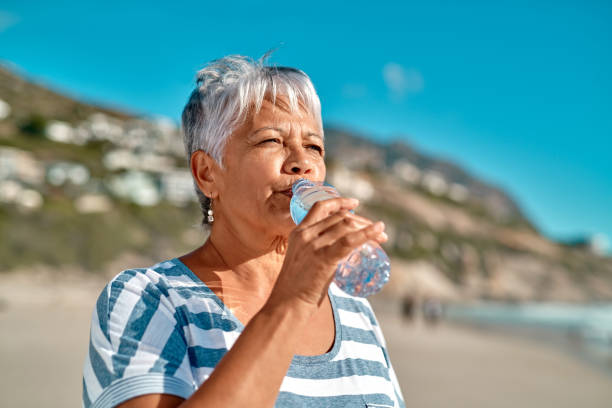Maintaining adequate hydration is essential for overall health, particularly for seniors. As we age, our body’s ability to conserve water diminishes, and our sense of thirst becomes less acute. Ensuring proper hydration can help prevent numerous health issues, such as kidney stones, urinary tract infections, and even cognitive impairments.
Prioritizing water intake and being mindful of daily hydration needs can significantly enhance seniors’ well-being and quality of life.
Contents
The Importance of Hydration for Seniors
Proper hydration becomes increasingly important for seniors as their physiological changes make them more susceptible to dehydration. Understanding water’s crucial role in various bodily functions is the first step towards adopting healthier hydration habits. This section will delve into the specific reasons why maintaining adequate fluid intake is vital for the elderly.
Physical Health Benefits
Proper hydration is crucial for maintaining physical health in seniors. Water aids digestion, nutrient absorption, and body temperature regulation. It also plays a key role in lubricating joints, which can help alleviate the pain associated with arthritis and other joint-related conditions.
Cognitive Function
Hydration has a direct impact on cognitive function. Dehydration can lead to confusion, memory issues, and a decline in mental clarity. Keeping well-hydrated supports better cognitive performance and can help prevent conditions such as dementia and other cognitive declines that are more prevalent in older adults.
Preventing Health Issues
Adequate water intake is essential for preventing a variety of health problems. For instance, it helps maintain kidney function, reducing the risk of kidney stones and urinary tract infections. Moreover, hydration is vital for cardiovascular health, contributing to the proper functioning of the heart and blood vessels.
Enhancing Quality of Life
Staying hydrated significantly enhances the overall quality of life for seniors. Proper hydration helps maintain energy levels, improve mood, and contribute to better physical and mental well-being. It can also aid in better sleep, as dehydration is known to cause sleep disturbances.
Simple Tips for Staying Hydrated
Incorporating more water-rich foods like fruits and vegetables, carrying a water bottle, and setting hydration reminders can make a big difference in daily water intake. These small changes can ensure that seniors meet their hydration needs without feeling overwhelmed.
Recognizing Signs of Dehydration in Seniors
Identifying and addressing dehydration early is crucial for maintaining senior health. This section will explore the various signs and symptoms of dehydration and measures for preventing it.
Early Symptoms of Dehydration
The initial signs of dehydration can be subtle, but recognizing them early can prevent serious health issues. Common early symptoms include dry mouth, fatigue, and dark-colored urine. Seniors may also experience dizziness or light-headedness.
Advanced Signs of Dehydration
If dehydration progresses, more severe symptoms may appear. These can include a rapid heart rate, low blood pressure, and confusion. In extreme cases, dehydration can lead to hospitalization. Monitoring these signs is essential for timely intervention.
Risks of Dehydration
Dehydration poses several risks for seniors, ranging from mild to severe. Chronic dehydration can lead to kidney damage, urinary tract infections, and complications in existing medical conditions. Understanding these risks underscores the importance of proper hydration.
Hydration and Medication
Certain medications can increase the risk of dehydration. Diuretics, laxatives, and some blood pressure drugs can lead to increased fluid loss. It’s important for seniors and their caregivers to be aware of these interactions and to compensate with additional fluid intake.
Monitoring Hydration Levels
There are practical ways to monitor hydration levels effectively. Keeping a hydration journal, using urine color charts, and regular weight checks can help track fluid balance. These methods offer a straightforward approach to ensuring adequate hydration.
When to Seek Medical Advice
Knowing when to seek medical advice is vital for managing dehydration. If symptoms persist despite increased fluid intake or if severe symptoms like confusion or rapid heart rate occur, it’s important to consult healthcare professionals promptly. Early medical intervention can prevent complications.
Understanding and implementing these strategies can significantly reduce seniors’ dehydration risk, contributing to their overall health and well-being.
Encouraging Hydration in Seniors

Promoting consistent hydration habits among seniors can be challenging but is vital for their well-being. By employing targeted strategies, caregivers and healthcare professionals can support seniors in achieving their daily water intake goals.
Creating a Hydration Schedule
Establishing a daily hydration schedule can help seniors develop a routine. This can include setting specific times for water intake, such as after waking up, before meals, and before bedtime. Regular hydration breaks throughout the day can ensure a consistent intake of fluids.
Flavoring Water
Sometimes, plain water may need to be more appealing to seniors. Natural flavors like lemon, cucumber, or mint can make water more enjoyable and encourage increased consumption. Herbal teas and low-sugar drinks can also be good alternatives.
Using Hydration Aids
Various aids are available to help seniors remember to drink water. Hydration reminder apps, smart water bottles that track intake, and alarms can be effective tools. These aids can help integrate hydration into daily routines seamlessly.
Educating About the Benefits
Understanding the benefits of hydration can motivate seniors to drink more water. Providing educational materials, workshops, and one-on-one counseling about the health advantages of staying hydrated can empower seniors to prioritize their fluid intake.
Involving Caregivers and Family
Support from caregivers and family members is crucial in encouraging hydration. They can play an active role by reminding seniors to drink water and offering fluid-rich foods. Collaborative efforts can significantly improve hydration habits.
Monitoring Progress
Regularly monitoring hydration progress helps ensure that seniors are meeting their fluid needs. This can be done through hydration journals, periodic health check-ups, and discussions with healthcare providers. Tracking progress can highlight improvements and areas needing attention.
By implementing these strategies, seniors, caregivers, and healthcare professionals can work together to enhance hydration practices, ultimately contributing to better health and quality of life for the elderly.
Conclusion
Proper hydration is crucial for maintaining senior health and well-being. By understanding the importance of hydration, recognizing the signs of dehydration, and implementing practical strategies to stay hydrated, seniors can improve their quality of life and prevent various health problems. Making hydration a priority is a simple yet powerful step towards healthy aging.
If you are in need of physical, occupational, or speech therapy services, please contact us at (920) 252-4442. We look forward to hearing from you.
